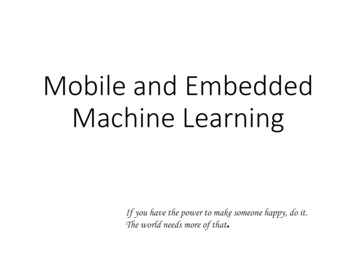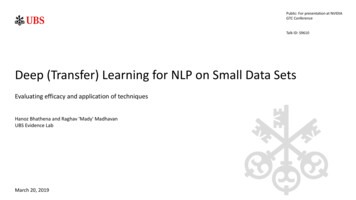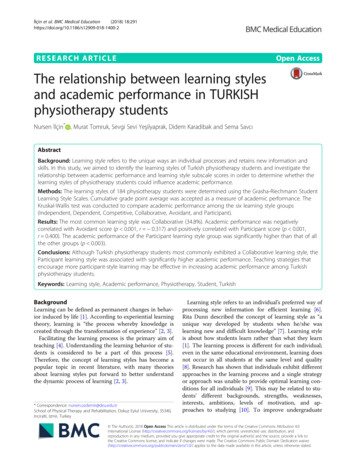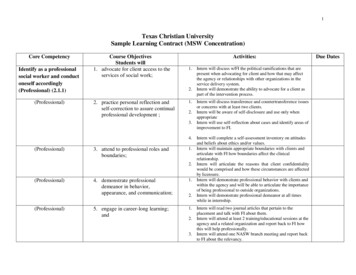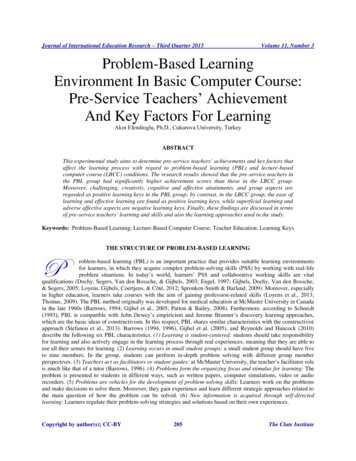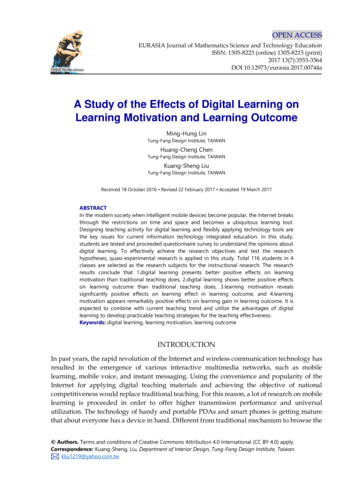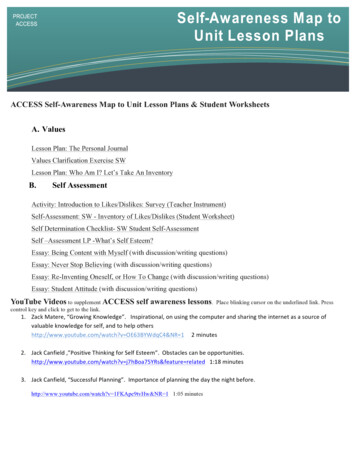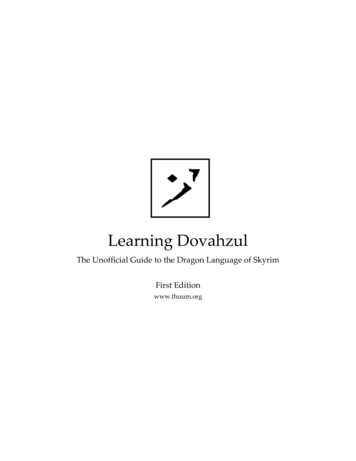
Transcription
ALearning DovahzulThe Unofficial Guide to the Dragon Language of SkyrimFirst Editionwww.thuum.org
Learning DovahzulTable of ContentsIntroductionVerbs & TenseWhat is Dovahzul?4What is a Verb?16Why learn Dovahzul?4What is Tense?16Canon and Non-Canon4The Verb Kos16Simple Present TenseAlphabet & Pronunciationand ConjugationAbout the Alphabet5Simple Past TensePunctuation Marks6Simple Future TenseApostrophes6and the Suffix -iinExercises7Progressive Present Tenseand the Suffix -vonSentence Structure17171718Simple Perfect Present TenseParts of Speech8Subjects, Verbs, and Objects8Progressive Perfect Present Tense19Phrasing Questions8Simple Progressive Future Tense19Exercises9Progressive Past Tense19Summary of Tenses20Verbs as Adjectives20Exercises21and the Suffix -aanPronouns & Articles18What are Pronouns?10Subject10Object10Possessive Determiner11About Prefixes & Suffixes22Possessive Pronoun11Dovahzul Prefixes22Reflexive11Dovahzul Suffixes23Articles11The Importance of Prefixes & Suffixes24Exercises12Exercises24Prefixes & SuffixesNames & PossessionReading & Writing in DovahzulWhat is a Noun?13About Reading & Writing in Dovahzul 25Plural Nouns13Reading in Dovahzul25Compound Words & se13Writing in Dovahzul26Possession13Writing Overlapping Diphthongs26Possessive Suffixes14Writing Apostrophes27Exercises152
Learning DovahzulHandwriting the Alphabet27Exercises29Advanced TranslationsAbout Advanced Translations40Translating fromNumbers & CountingAbout Dovahzul Numbers30Forming Long Numbers31Ordinal Numbers31Adverbial Numbers31Exercises32Dovahzul to English40Translating fromEnglish to DovahzulExercises4345Inventing WordsConversation & CommonPhrasesWhat’s in a Word?46Spelling with Meaning46Spelling Simply46Conversational Dovahzul33Using Diphthongs47Greetings33Using the Letter H47Asking & Answering Questions34Using Apostrophes47Other Phrases35Inventing New WordsExercises35from Existing WordsWord WallsAbout Word Walls36Animal Allegiance36Fire Breath36Kyne’s Peace37Storm CallExercisesInventing Entirely New Words48Testing a Word48Exercises48Exercise Answers4938Additional Resources5238Contributors53Grammatical Patternsin Word Walls47393
Learning DovahzulIntroductionlanguages. Our aspirations for Dovahzulare just as high, and it’s already beingspoken and practiced by several groups andcommunities; from writings, to works of art,roleplaying, and everyday conversation.The Dragon Language is a constructedlanguage featured in The Elder Scrolls V:Skyrim. It is spoken by Dragons and wasspoken by ancient Nords who learned toharness its power and use it against theirDragon masters. In the time that Skyrimtakes place, Dovahzul is known and spokenby a rare few, including the remainingDragons, and the Greybeards who followthe Way of the Voice.Skyrim itself is rich with Dovahzul writingand dialogue, and even only a basicunderstanding of the language will fleshout the game’s experience even more. Doyou want to know what the dragons saywhen they speak? Have you ever wanted tobe able to read the Word Walls? This guidewill help you accomplish that and more.Since the release of Skyrim, the language hasseen development and growth in the handsof its fans, who call it by many names:Dragon, Draconic, Dragontongue, Dovah,Dovahtinvaak (“Dragon-Speech”), Dovahzul(“Dragon-Voice”), and others. This guidewill use the name “Dovahzul”.The term canon refers to any word or part ofDovahzul that comes from Skyrim itself andis universally accepted as fact. Through theexpansion efforts, many words andgrammatical rules have been invented tobring the language to fluency. Theseadditions are referred to as non-canon.What you see here are the results of adedicated effort from the community atthuum.org to expand Dovahzul, includinggrammar, phrases, and vocabulary. Thefollowing lessons will take you throughpronunciation, sentence construction,grammar, the alphabet, common phrases,and other topics.Throughout this guide, each topic is markedwith an arrow for whether it is canon ornon-canon information:Canon topicNon-canon topicSeveral constructed languages have gainedwidespread use in their fan communities,most famously Star Trek’s Klingon, andJ.R.R. Tolkien’s Quenya and Sindarin elvenThis way, you can distinguish between therules of the original language, and the rulesthat have been added by the community.4
Learning DovahzulAlphabet & PronunciationGHI37The Dovahzul alphabet consists of 34 runes,each made by three or more slashes anddots. The letters were based on themarkings a dragon’s claws might make instone. Some letters have exact Englishequivalents, while others are combinationsof English letters (called ntPronunciationAcat, black, badaaon, hot, notahfather, car, all, atthe end of aword may bepronouncedwith German chBKLMNbread, ableDdragon, swordEnet, enter, at theend of wordsah andsometimes heyeiJO8Pwhy, hi, findeyhey, may, ableFfrost, afterQ5Ggold, forgetHhello, ahoyIiiirJsee, clean,rarely butsometimes winalways see,cleanhear, leer,irritatejust, adjacent, ifafter aconsonant thenyellKkite, attackLlore, helpMmother, immerseNno, end, kinOfoe, know,console,sometimes butrarely onoocool, typhoonPpie, apartQantique, muchlike k butfurther back inthe throat
Learning DovahzulRSTU56VWXYZRrun, arise,usually rolledon the tongueSsoft, senseTtale, fateUrule, fooluurule, fool, lesscommon thansingle uurlure, moorVvalley, eventWworld, awakeXaxe, fax, relax,never zYyet, yesterdayZzoo, mazeDovahzul, there is no apostrophe, so suchwords are spelled instead with the letter uu(5). The pronunciation for these words maydiffer slightly or not at all depending on thespeaker.One possible pronunciation is to make thevowel before the apostrophe long, and thevowel following short. In this case, thu’ummight be pronounced as thoo-um, su’um assoo-um. The apostrophe here does notindicate a full stop, but rather a change inthe sound of the vowels.Another possible pronunciation, althoughexceedingly uncommon, is pronouncingboth vowels long and stopping with theapostrophe. With this pronunciation, thu’umwould sound like thoo-oom, and su’um assoo-oom.Other times, mostly in casual conversation,words with apostrophes are pronouncedwith one long vowel. Here, thu’um wouldbe pronounced as thoom, and su’um as soom.This is the most common pronunciation ofapostrophes that you will encounter.Dovahzul does not have a letterThe following punctuation marks wereinvented to facilitate tequivalent to C. Instead, either S or Kare used to produce the same sound.When transliterating a name thatuses ch, the spelling tsh can be usedinstead.Some words are spelled in English withapostrophes, such as thu’um and su’um. In6
Learning DovahzulThe following exercises will help you learn the alphabet and its pronunciations.Write out the pronunciations of the following Dovahzul words or phrases as best you can. Forexample, based on Dovahzul, you might write “doe-vah-zool”.1. Dovahkiin2. Drem yol lok.3. Pruzah wundunne.4. Su’um ahrk morah.5. Kendovve los mul.6. Dovahhe bo ko lok.Look in the Exercise Answers section to check your work.7
Learning DovahzulSentence StructureThe term parts of speech refers to thedifferent categories of words that make up asentence. Below are some of the major partsof speech in alphabetical order.Part of SpeechFunctionExamplesadjectivedescribes anounThe red dragon.A brave warrior.adverbdescribes averbDragons flyquickly. Hevaliantly fought.conjunctionjoinssentences orphrasesNords arestrong andhardy.nounperson, place,name, thing,or ideaThis sword issharp. My nameis Aela.prepositionrelates otherwords,usually withdirectionI’m going intothe cave. Theircamp is on theriver.pronounstands for anounHe doesn’t knowthem.verbaction orstateI am here to slaydragons.Most sentences contain a subject, an object,and a verb. The subject is the noun that thesentence is about, and is performing theaction. The object is the noun that the subjectis performing the action on. The verb, then,is the action itself.In the sentence “The Dragonborn slaysdragons.”, the subject is “The Dragonborn”,the object is “dragons”, and the verb is“slays”.Sentence structure, in a very broad sense, ishow these parts are ordered. In English,sentences are structured subject-verb-object.Dovahzul is structured the same way, withsome exceptions which we’ll get to below.Dovahzul grammar isanalogous to English’s in mostcases. When in doubt, writeyour sentence in English andtranslate it word by word.Some of these will become very importantlater , especially nouns, pronouns, verbs,and adjectives.Dovahzul is known for being a brief andstraightforward language. Phrasing8
Learning Dovahzulquestions in English involves extra wordsthat Dovahzul can do without. Take, forexample, the question, “Do you slaydragons?” In Dovahzul, you can remove“Do” and switch the subject and the verbaround. This then literally becomes, “Slayyou dragons?”This makes for a shorter way of phrasingquestions. English’s longhand version isgrammatically correct as well.The following exercises will help you learn about parts of speech and sentence structure.1. What are the nouns in the sentence, “Belethor sold the shield to Lydia?”2. What are the verbs in the sentence, “Do you know where I can find the Jarl?”3. What are the subject, object, and verb in the sentence, “Miraak betrayed the dragons.”4. Rephrase the question, “How do you forge Daedric weapons?”, as it might appear inDovahzul.Look in the Exercise Answers section to check your work.9
Learning DovahzulPronouns & ArticlesAs we’ve learned in the previous lesson, apronoun is a noun that is used in place ofanother noun or name. English pronounsinclude I, you, he, she, it, they, and we.Pronouns form the core of many languages’base vocabulary.SubjectObjectPossessiveDeterminerThe pronouns below are listed according tofirst-person, second-person, third-person,and then the plurals of each. Canonpronouns are marked with while noncanon pronouns are marked with .PossessivePronounReflexivezu'u (I)zey (me)dii (my)dii (mine)dimaar (myself)hi (you)hi (you)hin (your)hinah (yours)hinmaar (yourself)rok (he)mok (him)ok (his)okah (his)okmaar (himself)rek (she)mek (her)ek (her)ekah (hers)ekmaar (herself)nii (it)nii (it)niil (its)niilah (its)nimaar (itself)nust (they)niin (them)niist (their)niistah (theirs)niistmaar (themselves)mu (we)mii (us)un (our)unah (ours)unmaar (ourselves)hei (you,plural)hein (your,plural)heinah (yours,plural)hei (you,plural)The subject column is for pronouns that areused as the subject of a sentence, describedin the previous lesson.heinmaar (yourselves)The object column is for pronouns that areused as the object of a sentence, described inthe previous lesson. Some are the same asthe subject pronouns, like hi (you) and nii(it).10
Learning DovahzulThe possessive determiner column is forpronouns that are used to show possession.For example, my sword or his crown. InEnglish, the possessive determiner her is thesame as the object pronoun her, but they arenot the same in Dovahzul (mek and ek,respectively). The difference between theseis: “She gave me her sword.” (possessivedeteminer), and “I gave the sword to her.”(object). Translated into Dovahzul, thesewould be “Rek ofan zey ek zahkrii.”, and“Zu’u ofan zahkrii wah mek.”The reflexive column is for pronouns thatrefer to themselves. Each reflexive pronounis suffixed with -maar.The term article refers to the words the anda/an, both commonly used in English. Beloware the equivalent Dovahzul articles:English ArticleDovahzul Articlethe (informal)finWith the exception of dii, thethe (formal)faalpossessive pronoun is alwaysa / anaanthe possessive determiner plusFaal is used over fin when referencing a propernoun or something held in high regard. Forexample, “the king” would be translated as “finjun”, but “the King”, would be translated as“faal jun”. Aan is for both a and an, regardlessof whether the next word begins with a vowelor consonant.the suffix -ah.One important grammatical difference betweenEnglish and Dovahzul is that Dovahzul almostalways leaves out articles with exception offaal. The words the and a/an are removedwherever possible. For example, in thesentence, “The sword of a king is sharp.” wouldliterally read “Sword of king is sharp.”Translated, this is “Zahkrii do jun los kinzon.” Ifking was a proper noun, though, faal would bekept; “Zahkrii do faal Jun los kinzon.”The possessive pronoun column is forpronouns that are used to show possessionwith the verb to be. English examplesinclude “The sword is hers.” and “Mine is thearrow that will kill the dragon.” In Dovahzul,dii (my/mine) is both the possessivedeterminer and the possessive pronoun. InEnglish, his and its are both the possessivedeterminer and possessive pronoun, but becareful - they are not the same in Dovahzul.Cases where articles are kept include poetry orlyrics, where they can provide a needed extrasyllable.11
Learning DovahzulThe following exercises will help you learn about Dovahzul pronouns.1. Translate the pronouns of the following sentence into Dovahzul, “I heard you facedhim on the battlefield.”2. Translate the pronouns for the following sentence into Dovahzul, “This battle is hers.She will fight it herself.”3. What type of pronoun is his in, “Dragonborn, Dragonborn, by his honor is sworn ” ?4. Practice filling out the pronoun table featured in this lesson by memory as much asyou can. Remember that except for dii, the possessive determiners end with -ah, andthe reflexives end with -maar.5. Rewrite the following sentence in English as if it were Dovahzul, keeping its rule onarticles in mind, “By the gods, I saw a dragon.”6. In the following sentence, would you keep the word the or remove it? “The Mask ofVokun lies buried in his crypt.”Look in the Exercise Answers section to check your work.12
Learning DovahzulNouns & PossessionFor nouns that end in a vowel like zahkrii,the suffix -he is added; zahkriihe.As we’ve learned in the Sentence Structurelesson, a noun is a person, place, thing, oridea. They form a major part of anylanguage; half of all canon Dovahzul wordsare nouns. In this lesson, we’ll examine thegrammatical rules surrounding nouns anddifferent ways to show possession betweenthem.A compound word is a single word made upof two or more joined words. Englishexamples include butterfly, quicksand, andunderground. Compound words that showpossession in Dovahzul are connected bythe word se. This se also means of, but isused exclusively for making compoundwords. In the above example, ”lahvraan dojun” could be compounded into one word;lahvraansejun. Other examples includeqethsegol (“bone of the earth”), junnesejer(“kings of the east”), and Ahrolsedovah (“hillof the dragon”, the Dovahzul name forWhiterun).Nouns that are plural refer to multiplepersons, places, things, or ideas, as opposedto a noun that is singular and refers to onlyone person, place, thing, or idea. TheEnglish plural suffix is usually -s. Dovahzulis not much more complicated; the last letterof the noun is repeated, and the suffix -e isadded to the end. For example, dovahbecomes dovahhe, jun becomes junne, and zulbecomes zulle. The pronunciation of this e islike ah, except for nouns that end in ah suchas dovah. Then, it is pronounce as the letterey (see the Alphabet & Pronunciation lessonfor more details).It is usually best to keep the words separateunless they can be compounded easily andthe resulting compound isn’t excessivelylong. For example, it would be best to write”the Axe of Whiterun” as “faal Hahkun doAhrolsedovah” instead of “faalHahkunseahrolsedovah”.This plural rule is not strict. Where inEnglish some nouns are their own pluralssuch as sheep, fish, or moose, all Dovahzulnouns can potentially be their own plurals.The Word Walls are the starkest example ofthis, where plural suffixes are not featuredat all. This may also be seen in songs orpoetry, where an extra syllable needs to beremoved.Possession is showing a relationship ofownership between two nouns. We’vealready seen how pronouns can be used toillustrate this; my sword, her horse, the thronethat is his. Other English examples ofpossession include “the spoon of Ysgramor”and “the king’s army”. English most13
Learning Dovahzulcommonly makes use of the –‘s suffix toshow possession. Dovahzul differs fromEnglish here in that it doesn’t have such asuffix. Instead, there are other ways torephrase things and a unique set of suffixesto use.Equivalent PronounShowing possession in Dovahzul willusually be through the word do(pronounced “doe”), meaning of. Forexample, “the king’s army” would berephrased as “the army of the king”, or“lahvraan do jun”.Possessive Suffixmy-iyour-i,his/her/its-iitheir-u,our-uyour (plural)-einoun ends with a vowel-l-o-aThis suffix replaces my, your, our, or anyother possessive determiner used with anoun. For example, ”my king” could betranslated as “dii jun” or “juni”; “our father”could be translated as “un bormah” or“bormahu”. If a noun ends in a vowel, thesuffix -l is used instead; “my sword” wouldbecome “zahkriil”, or “their dragons” wouldbecome “dovahhel”.A suffix is a set of letters added to the end ofa word that changes its meaning (theopposite being a prefix, added at thebeginning of a word). Dovahzul has a seriesof possessive suffixes that can be used toindicate possession in place of pronouns.When to use the pronouns or the suffixescomes down to personal preference. Whendealing with nouns that end in vowels asshown above, it is preferable to use thepronouns, since dovahhel could mean “mydragons” as well as “their dragons” withoutany further context.Following is a table of suffixes organizedaccording to pronoun. Canon suffixes aremarked with while non-canon suffixesare marked with .The non-canon suffixes –o and –a wereinvented to distinguish between my andyour, and our and their.14
Learning DovahzulThe following exercises will help you learn about nouns and possession in Dovahzul.1. Give the plural forms of the following nouns: Yol, Strunmah, Zii, and Hokoron.2. Write out the pronunciation for the plural form of Monah.3. The word for queen is jud, and the word for sword is zahkrii. How would you translate“the queen’s sword” into Dovahzul?4. The phrase “my brothers” can be expressed as “dii zeymahhe” or “zeymahhel”. Which isbetter?5. The word for is is los. Using everything you have learned so far, translate “The Sword ofQueens is hers.” into Dovahzul.Look in the Exercise Answers section to check your work.15
Learning DovahzulVerbs & TenseAs we’ve learned in the Sentence Structurelesson, a verb is a word that expresses actionor state. The most common verb of Englishis to be. Where nouns make up half of thecanon language’s lexicon, verbs make upanother quarter. There are two main topicsto cover when dealing with verbs: verbtense and verb conjugation.Tense is when a verb is happening, and isbroken down into a number of differenttypes. On a very basic level, a tense can bepast (the action has already happened),present (the action is happening), or future(the action will happen). Some specifictenses are listed below with Englishexamples.TenseEnglish ExamplesSimple presentHe talks.He does not talk.Does he talk?Progressive presentHe is talking.He is not talking.Is he talking?Simple perfect presentHe has talked.He has not talked.Has he talked?Progressive perfectpresentHe has been talking.He has not beentalking.Has he been talking?Simple progressivefutureHe will be talking.He will not be talking.Will he be talking?Progressive pastHe was talking.He wasn’t talking.Was he talking?After an overview of the verb to be, we willexamine each of these tenses individuallyand how they can be expressed inDovahzul.One misconception is that Dovahzullacks verb tense altogether. This stemsfrom the fact that Dovahzul doesn’tSimple pastSimple futureHe talked.He did not talk.Did he talk?distinguish between simple presenttense and simple past tense.He will talk.He will not talk.Will he talk?In Dovahzul, kos is the verb that means to be.Kos is the infinitive form of the verb, that is,16
Learning Dovahzulit is equivalent to be. Like English, it hasseveral conjugations, or forms, depending onthe subject and tense.Simple present tense is the most basic tense towork with, as it requires no special suffixesor alterations. In English, verbs areconjugated according to the subject. Forexample, “I know”, “he knows”, “they know”,etc. For most verbs, the suffix –s is addedwhen the subject is third person singular(he, she, it).Below are all forms of kos and their Englishequivalents.English /werelosthas/have beenkosaanhath (formal)loostIn Dovahzul, verbs are not conjugated likethis at all. A verb will always remain thesame in both simple present tense andsimple past tense no matter what the subjectis. The above examples translate to “zu’umindok”, “rok mindok”, and “nust mindok”.The verb mindok, to know, doesn’t change.Notice that los means am, are, and is, and lostmeans both was and were. “Hi los” means“you are”, just as “zu’u los” means “I am”.Likewise, “mu lost” means “we were” just as“rok lost” means “he was”.It is instinctive to add the pluralsuffix to verbs when the EnglishLike the articles fin and aan discussed inPronouns & Articles, the verb kos is often cutto shorten speech. This occurs most often inconversation and dialogue, while less oftenin writing such as those featured on WordWalls. Therefore, if you were to say “I amthe Dragonborn!”, you could translate itsimply as “Zu’u Dovahkiin!”verb ends with an s (forexample, “rok mindokke”).Don’t! Remember, verbs neverconjugate according to subject.Another misconception is that zu’u isequivalent to English’s I’m, and that thepronoun I is actually zu. This is untrue.Just as verbs do not change betweensubjects, they also do not change betweensimple present tense and simple past tense.Where English’s “I know” would become “Iknew”, Dovahzul’s “zu’u mindok” meansboth “I know” and “I knew”. This is mostclearly seen on the Word Walls, which are“Zu’u Dovahkiin!” does mean “I’m theDragonborn”, but only because los is cutfrom the longer “Zu’u los Dovahkiin!”,not because zu’u means I’m.17
Learning Dovahzullargely written in simple past tense.However, there are a few exceptions to thisrule, and we can use these exceptions toprovide a better distinction between thesimple present and simple past tenses.The present progressive tense is prominent inEnglish, where it uses the uses the verb to bewith the suffix –ing to indicate an actionthat is in the middle of being performed.Examples include “I am running”, “kings aredying”, or “we are winning”. There are a fewways to express present progressive tense inDovahzul. One way is to not change theverb at all. “Zu’u ru” can mean both “I run”and “I am running”. This choice reflects thebrief nature of the language.Earlier we saw that los changes to lost in thesimple past tense. Another verb thatchanges is dreh, or do. Its simple past form isdrey, or did. You can use dreh and drey to bemore clear about tense where there aren’tmany other clues. “I know” could berephrased as “I do know” for the simplepresent tense, and “I knew” as “I did know”for the simple past tense. These wouldtranslate to “Zu’u dreh mindok” and “Zu’udrey mindok”. It is more common to opt outof using dreh for present tense and then usedrey to refer to past tense, instead of usingdreh for present tense and leaving drey outfor past tense.Another way is to use the verb los inconjunction with the verb. This can be usedto specify present progressive tense moreclearly. For example, “zu’u los ru” means “Iam running”, but cannot also mean “I run”.As explained previously, los is often cut,which would leave “zu’u ru” anyways, butit can be left in for clarification.A third option is the invented suffix –von,which is equivalent to English’s –ing. Withthis suffix, los is no longer needed. Thus, “I amrunning” could translate to “zu’u ruvon”. Thissuffix also becomes useful later fordistinguishing “I was running” and “I have run”,since the Dovahzul’s lost means both was andhave.In English, simple future tense is expressedthrough the verb will; “I will go”, “they willdie”, “we will run”. In Dovahzul, there aretwo ways to express simple future tense.The first is by using the verb fen, equivalentto will, and translating literally; “zu’u fenshur”, “nust fen dir”, “mu fen ru”.The second way is to use the suffix –iin.With this suffix, the above translationsbecome: “zu’u shuriin”, “nust diriin”, and“mu ruiin”. This suffix is always -iin exceptwhen a verb ends with ah, where it becomes-liin. For example, with mah being the wordfor to fall, “you will fall” would translate to“hi mahliin”.In English, the simple perfect present tenseuses the verb to have to indicate tense. Forexample, “I have slain the dragon”, or “Alduinhas fallen”. Again, there are two ways toexpress this in Dovahzul; one is with theverb lost, which as we learned earlier means18
Learning Dovahzulwas/were, but also means to have. With lost,the above would translate to “zu’u lost kriidovah”, and “Alduin lost mah”. Be carefulwhen using this alongside the pastprogressive tense (“Alduin was falling”) andmake use of the suffix –von should you needto.Just as progressive perfect past tense useskos with the suffix -aan, simple progressivefuture tense uses kos with the suffix –iin.English examples of simple progressivefuture tense include “I will be slayingdragons” and “you will be dying”. As before,you can translate literally; “zu’u fen kos kriidovahhe”, “hi fen kos dir”, or use the -iinsuffix; “zu’u kosiin krii dovahhe”, “hi kosiindir”.The most common way of expressing theperfect present tense is with the suffix -aan,the sister suffix to -iin. Like -iin, it becomes laan if the verb ends in ah. Using this, thetranslations above are instead, “zu’u kriaandovah” and “Alduin mahlaan”. Notice inkriaan, only the first i of krii is kept.The suffix -von can also be used here todistinguish between “I will be slaying” and“I will be slain”. If the suffix isn’t used,context is still a good indicator of which ismeant. The above example could nottranslate to “I will be slain dragons”.Following the lead of simple perfectpresent, progressive perfect present tensemakes use of the -aan suffix in conjunctionwith kos. English examples of progressiveperfect present tense include “I have beenslaying dragons” and “She has been good”.You can translate it literally; “zu’u lost koskrii dovahhe”, “rek lost kos pruzah”, or themore conventional way with the -aan suffix;“zu’u kosaan krii dovahhe” and “rek kosaanpruzah”.Progressive past tense uses lost to meanwas/were to indicate past tense. In English,examples would “I was slaying dragons” and“you were dying”. The important thing hereis to distinguish between simple perfectpresent tense (“I have slain dragons”) andprogressive past tense, since lost means bothto have and was/were. Where you might usethese tenses alongside one another, alwaysuse the suffix -aan where you can and uselost for progressive past tense. Thus, “I wasslaying dragons” would translate to “zu’u lostkrii dovahhe” while “I have slain dragons”would translate to “zu’u kriaan dovahhe”.The suffix -von can also be used here todistinguish between “I have been slaying”and “I have been slain”. If the suffix isn’tused, context is still usually a goodindication of which is meant. The aboveexample could not translate to “I have beenslain dragons”.If necessary, the suffix -von can be used todistinguish progressive past tense as well;“zu’u lost kriivon dovahhe”.19
Learning DovahzulBelow is a table of the sentence “I fightdragons” conjugated to all of the abovetenses. The word for to fight is krif.TenseSimplepresentEnglishDovahzulI fightdragons.Zu’u krifdovahhe.Simple pastI foughtdragons.Zu’u krifdovahhe /Zu’u drey krifdovahhe.I will fightdragons.Zu’u fen krifdovahhe /Zu’u krifiindovahhe.Simple futureProgressivepresentI am fightingdragons.Zu’u krifdovahhe /Zu’u los krifdovahhe /Zu’u krifvondovahhe.Simple perfectpresentI have foughtdragons.Zu’u krifaandovahhe.I have beenProgressiveperfect present fightingSimpleprogressivefutureI will befightingdragons.Zu’u fen koskrif dovahhe /Zu’u kosiinkrif dovahhe.ProgressivepastI was fightingdragons.Zu’u lost krifdovahhe.Sometimes a verb can be conjugated tobecome an adjective. In English, this isaccomplished through either -ing or thesuffix –ed. For example, “the conqueringking”, or “the conquered king”.For Dovahzul, these will require somerephrasing; instead of “the conquering king”,you would say, “the king who conquers”, or“jun wo kron”. Instead of “the conqueredking”, you would say, “the king who wasconquered”, or “jun wo lost kron”.Shorter, invented alternatives includeusing the suffixes –von and –aan to formadjectives. With these, the above wouldread “kronvon jun” and “kronaan jun”.Zu’u kosaankrif dovahhe.dragons.20
Learning DovahzulThe following exercises will help you learn about Dovahzul verbs and tense.1. The word kril means brave. How would you say “I am brave”, “they are brave”, and“we were brave”?2. The word shur means to go, wah means to, and kein means war. Translate, “She goes towar. He went to war. They will go to war.”3. The word for kingdom is junaar, and the word for conquer is kron. How would youtranslate “The kingdom has been conquered.” into Dovahzul?4. Using the same vocabulary from question #3, how would you say “I have conqueredthe kingdom”?5. Using the vocabulary from questions #1 and #3, translate into Dovahzul, “The warringkingdoms have fallen.” The word for that is tol, although you can use wo as well. Theword for fall is mah.6. Practice your pronouns by writing translating the following: “I conquer”, “youconquer”, “he conquers”, “she conquers”, “it conquers”, “they conquer”, “we conquer”,and “you all conquer”.Look in the Exercise Answers section to check yo
Learning Dovahzul 6 R R run, arise, usually rolled on the tongue S S soft, sense T T tale, fate U U rule, fool 5 uu indicate a full stop, but rather a change in rule, fool, less common than single u 6 ur lure, moor V V valley, event W W world, awake would sound like X X axe, fax, relax, never z Y Y yet, yes
